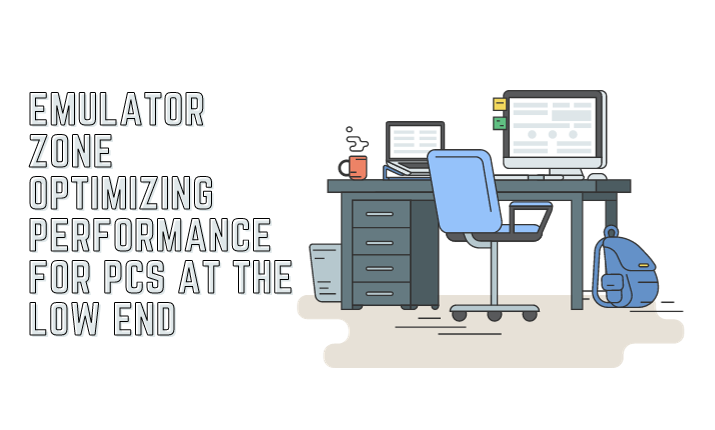Emulator Zone Optimizing Performance for PCs at the Low End
Emulators, the program that allows modern computers to run applications and games made for older hardware, have become extremely popular. However, not all computers have high-end processors and plenty of memory. If you have a PC with a low-end model, experiencing a smooth, unwavering emulation experience is very difficult. In the article below, we’ll examine the process of optimizing emulator performance on low-end PCs and ensure that your journey through memory is as smooth as possible.
Understanding Emulators
Before we dive into the world of optimization, we must first understand the idea of emulators. Emulators are software programs that emulate the functions of older systems or hardware. They let your computer play games and software specifically designed for platforms such as arcade machines and even older operating systems.
The Challenge of PCs with low-end specs
Most low-end PCs come with limited RAM and CPU capabilities. This makes running emulators that require a lot of resources challenging. For a smooth experience without stutters, you’ll have to make some changes to improve your emulator’s performance.
Why should you optimize for low-end PCs?
Optimizing low-end PCs isn’t only about making the experience more enjoyable; it’s about making it feasible. Many classic games and programs can be a blast to revisit, and a lower-end PC should be good for your nostalgic journey. Optimizing can also prolong the life of your system by easing the load on your system.
Selecting the Best Emulator
Selecting the best emulator is the most important step. Certain emulators were designed with speed in mind. Find ones that are suitable for your system’s capabilities.
Modifying Emulator Settings
After you’ve chosen the emulator you want to use, go through the settings. Lower the processing and graphic settings to be compatible with your PC’s capabilities. Reducing resolutions can dramatically increase performance.
Graphics Configuration
Graphics are the primary strain for low-end computers. Change settings like shaders, anti-aliasing, and texture quality to achieve the ideal level of performance and quality.
Sound Optimization
Sound emulation is also the source of resource consumption. Set sound settings to lessen the burden on your processor.
Input Latency
A high level of input latency could render games impossible to play. Set your input settings so that you can reduce the amount of time between your input and the game’s response.
Reducing the load on the system
Shut down unnecessary background applications to free up your system resources. The emulator running in fullscreen mode could aid in reducing system distractions.
Game-specific tweaks
Certain games may require unique adjustments. Test the settings of individual games to discover the best performance.
Updates and Patches and Updates
Make sure your games and emulators are updated. Developers frequently issue patches that improve performance on lower-end computers.
Utilizing External Tools
Think about using tools external to your computer, such as game controllers or specialized input devices, to boost your playing experience.
Benchmarking and testing
Check your emulator’s performance and test it regularly to ensure the best settings. This will ensure your low-end PC will continue to offer an enjoyable experience.
Conclusion
Optimizing the performance of emulators for low-end computers is a matter of choosing the appropriate emulator, tweaking settings, and testing regularly for the highest version. With a little patience and experimentation, you can play the classic games you love with no lag or annoyance.
FAQs
How do you define an emulator?
Emulators are software that lets modern computers play games and software designed for older hardware systems.
Why is optimizing low-end PCs vital?
Optimizing ensures that even low-end PCs can run emulated programs without a hitch and can extend the longevity of the equipment.
How can I cut down on the amount of input latency when emulating games?
You can lower the amount of input latency by altering input settings and employing external tools, such as game controllers.
Why is sound optimization so crucial to improving emulator performance?
Sound optimization helps reduce the stress on your CPU. This leads to a better overall performance.
What can I do if a specific game isn’t running well on my budget PC?
Try out different game settings and ensure that your game and emulator are up-to-date for possible performance enhancements.
